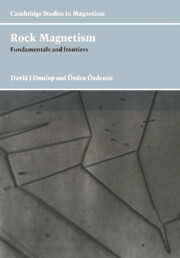Book contents
- Frontmatter
- Contents
- Preface
- Chapter 1 Magnetism in nature
- Chapter 2 Fundamentals of magnetism
- Chapter 3 Terrestrial magnetic minerals
- Chapter 4 Magnetostatic fields and energies
- Chapter 5 Elementary domain structures and hysteresis
- Chapter 6 Domain observations
- Chapter 7 Micromagnetic calculations
- Chapter 8 Single-domain thermoremanent magnetization
- Chapter 9 Multidomain thermoremanent magnetization
- Chapter 10 Viscous and thermoviscous magnetization
- Chapter 11 Isothermal magnetization and demagnetization
- Chapter 12 Pseudo-single-domain remanence
- Chapter 13 Crystallization remanent magnetization
- Chapter 14 Magnetism of igneous rocks and baked materials
- Chapter 15 Magnetism of sediments and sedimentary rocks
- Chapter 16 Magnetism of metamorphic rocks
- Chapter 17 Magnetism of extraterrestrial rocks
- References
- Index
Preface
Published online by Cambridge University Press: 06 July 2010
- Frontmatter
- Contents
- Preface
- Chapter 1 Magnetism in nature
- Chapter 2 Fundamentals of magnetism
- Chapter 3 Terrestrial magnetic minerals
- Chapter 4 Magnetostatic fields and energies
- Chapter 5 Elementary domain structures and hysteresis
- Chapter 6 Domain observations
- Chapter 7 Micromagnetic calculations
- Chapter 8 Single-domain thermoremanent magnetization
- Chapter 9 Multidomain thermoremanent magnetization
- Chapter 10 Viscous and thermoviscous magnetization
- Chapter 11 Isothermal magnetization and demagnetization
- Chapter 12 Pseudo-single-domain remanence
- Chapter 13 Crystallization remanent magnetization
- Chapter 14 Magnetism of igneous rocks and baked materials
- Chapter 15 Magnetism of sediments and sedimentary rocks
- Chapter 16 Magnetism of metamorphic rocks
- Chapter 17 Magnetism of extraterrestrial rocks
- References
- Index
Summary
The magnetic compass was one of mankind's first high-technology devices. Possession of the compass gave the Islamic world an early edge in navigation and led to the rapid eastward spread, by sea, of their trade, religion and civilization. But man was a comparative latecomer in magnetically aided navigation. Birds, fish, insects, and even bacteria had evolved efficient compasses millions of years earlier.
Magnetic memory, whether of a compass needle, a lava flow, or a computer diskette, is a remarkable physical phenomenon. The magnetic moment is permanent. It requires no expenditure of energy to sustain. Yet it can be partly or completely overprinted with a new signal. Nowhere is this more strikingly demonstrated than in rocks. A single hand sample can record generations of past magnetic events. This family tree can be decoded in the laboratory by stripping away successive layers of the magnetic signal.
Paleomagnetism is the science of reading and interpreting the magnetic signal of rocks. Rock magnetism is more concerned with the writing or recording process. The principles are no different from those of fine-particle magnetism as applied in permanent magnet and magnetic recording technology. But the physical parameters are rather different. Weak magnetic fields are involved, on the order of the present geomagnetic field (0.3–0.6 G or 30–60 μT), much less than the switching fields of the magnetic particles. Temperatures may be high: thermoremanent magnetization of igneous rocks is acquired during cooling from the melt. Times are long, typically millions of years.
- Type
- Chapter
- Information
- Rock MagnetismFundamentals and Frontiers, pp. xix - xxiiPublisher: Cambridge University PressPrint publication year: 1997

